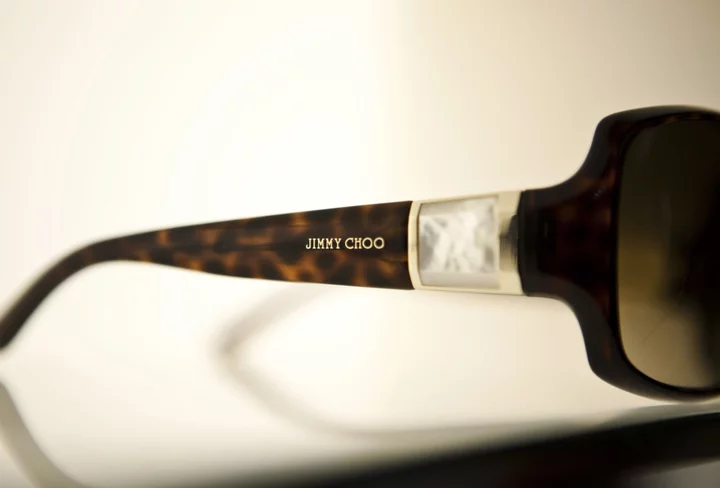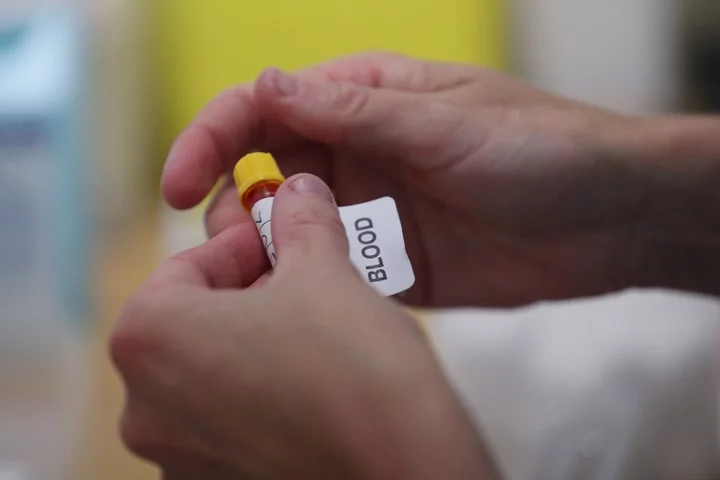
Music from Teyvat: Minichestra plays Genshin Impact
DUSSELDORF, Germany--(BUSINESS WIRE)--Jun 29, 2023--
2023-06-29 16:27

EssilorLuxottica Adds Jimmy Choo to Its Deep License Portfolio
EssilorLuxottica SA, the world’s biggest eyeglass maker, will produce Jimmy Choo Eyewear under a 10-year licensing deal starting
2023-06-29 16:23

Heart disease digital check-ups for over 40s being rolled out
People over 40 in England will be sent a blood test to carry out at home in a bid to reduce heart disease and obesity. Digital NHS health checks, which will also include an online health questionnaire, will be launched next spring for people aged 40 to 74. Around 15 million people will be eligible, with around one million online checks expected to be carried out over the next four years. Health and Social Care Secretary Steve Barclay said: “Thousands of heart attacks and strokes could be prevented every year through simple health checks, which could save lives and ease pressure on the NHS. “This new digital check-up will mean people can do simple tests and get tailored advice from homes while reducing pressure on GP services.” The home blood test will check cholesterol levels with patients asked to take a blood pressure test at a pharmacy, alongside the online assessment covering details such as weight, height, diet, alcohol intake and exercise levels. Results will be made available online with help available to anyone showing early signs of issues such as diabetes or heart disease, as well as referrals to weight-loss clinics or medication. The online questionnaire will be available via phone, tablet or computer and the Government believes each check will save 20 minutes of NHS time. This could play an important role in helping people live healthier for longer and saving lives in the coming years, while reducing pressure on the NHS Professor Sir Nilesh Silemani Cardiovascular disease is the second biggest killer in England, affecting around 6.4 million people. The Government says the new digital check will help to identify 200,000 people who could benefit from the use of statins, 30,000 cases of hypertension and prevent around 400 heart attacks and strokes over the first four years. Professor Sir Nilesh Samani, medical director at the British Heart Foundation, said: “This initiative will help to reach more people and encourage them to get their blood pressure and cholesterol levels checked so that, where necessary, healthcare professionals can work with them to manage their condition. “This could play an important role in helping people live healthier for longer and saving lives in the coming years, while reducing pressure on the NHS.” Existing NHS health checks for people in the same age group take place face-to-face with a GP and concerns have been expressed that elderly people are not left behind if they struggle with technology. David Baines, vice chair of the Local Government Association, told The Times: “Making more digital health checks available is a useful tool to detect certain illnesses but it should be treated as an addition to, not a replacement for, a physical health check.”
2023-06-29 16:15

Ipsen Gets FDA Advisers’ Backing for Rare Bone Disease Drug
Ipsen SA’s drug for a rare bone disease got support from a panel of US drug regulatory advisers,
2023-06-29 15:21

Over 120 million Americans are under air quality alerts as smoke and hazy skies from Canada's wildfires stretch into third day
Dangerous air quality and hazy skies persist from Toronto to Washington, DC, as smoke from Canada's raging wildfires drifts south — with more than 120 million under air quality alerts within the US.
2023-06-29 14:57

What is colour analysis and why is TikTok obsessed with it?
The latest fashion trend to go viral online doesn’t involve a hot new denim style or designer handbag – it’s about overhauling your entire wardrobe with the help of colour analysis. Professional stylists and amateur enthusiasts alike have been sharing videos of fashionistas swathed in swatches of fabric as they endeavour to discover the palette of colours that suits them best. Also known as ‘finding your colours’, the topic is exploding on social media, with millions of video views on TikTok and 100k posts under #colouranalysis on Instagram. “TikTok users love educational content and transformation stories,” says Cliff Bashforth, managing director of Colour Me Beautiful, which provides personal colour consultations. “Colour analysis provides a captivating narrative, and the system can be proven by displaying ‘before and after’ makeovers, good and bad colours on an individual and colour combinations.” While trends like this year’s ubiquitous Barbie pink will keep popping up from time to time, consumers are increasingly rejecting the idea of ‘must-have’ pieces and adopting a more personalised approach. “With the general conscience turning away from fast fashion, colour analysis is a good way to ensure you’re buying something that will suit you perfectly and last a lifetime,” says Megan Watkins, head stylist at SilkFred. What are the benefits of colour analysis? “For many people, finding their most flattering shades of clothing (and make-up) is a life-changing experience,” says Bashforth. “Wearing your best shades of clothing enhances your natural colouring, brings out your individuality, boosts confidence, and ensures you always look your best, effortlessly expressing your personal style.” As well as guiding how you buy and style clothes, colour analysis can suggest flattering make-up and hair shades. Watkins says: “Finding the right colour palette for you will elevate your entire aesthetic and can even help with making your skin look brighter and minimise dark circles.” What happens at a colour analysis appointment? “It is a common misconception that ‘finding your colours’ is down to your hair colour or eye colour – it’s all about your skin,” says Watkins. “Your skin undertone stays the same no matter your age or how long you’ve been in or out of the sun, so assuming the colour analysis is done correctly, your colour palette will stay the same for the rest of your life.” At a professional colour analysis session, which can last up to two hours, a stylist will look at how different groups of shades look against your face. “Larger coloured swatches – known as ‘drapes’ in the trade – are used to test for the undertone, depth and clarity of the individual’s colouring,” Bashforth explains. “Some companies also use the seasonal method and categorise people into spring, summer, autumn, or winter. “At Colour Me Beautiful we start by explaining our 24-palette system so the client fully understands why he or she falls into a certain colouring type.” The stylist will talk through colour combinations, outfit ideas and make-up suggestions, and you’ll be given a fabric swatch to use as a guide for shopping. “No longer is an individual told ‘what colours to wear’,” Bashforth adds. “Instead a flexible approach has been adopted which means a client is shown ‘how to wear colour’ – it’s more about the shades of a hue, rather than the hue itself.” Can you do it yourself? While a thorough consultation with a specialist is the best way to find your perfect palette, there are some principles you can borrow to try some DIY colour analysis. “Gather up a variety of tops, knitwear etc. in warmer and cooler hues,” says Bashforth, starting with no make-up and wearing a top in a basic neutral shade. “In daylight, stand in front of a mirror and hold each garment up to your face, observing whether your complexion is enhanced and looks fresher, or your skin appears dull or pale.” You could also use the ‘vein test’ to see where you fall on the warm/cool divide. “All you need to do is check your wrist and see if your veins appear as a more green shade or if they appear to be a blue/purple hue,” says Watkins. “If you’re on the green side, this is classed as a warm tone, if you’re veering towards blue or purple then you’re on the cooler side of things.” She adds: “If you’re looking for a colour that suits just about everyone, primary red is a good bet as it partners well with every other colour on the colour wheel.” Leem Ruffled-Hem Woven Maxi Dress in Olive, £145, Selfridges Roman Blue Sleeveless Abstract Print Maxi Dress, £60 River Island Pink Ruched Sleeve Blazer, £65; Pink Wide Leg Pleat Trousers, £40 Oliver Bonas Gold & Yellow Striped Midi Dress, £79.50 Read More Charity boss speaks out over ‘traumatic’ encounter with royal aide Ukraine war’s heaviest fight rages in east - follow live Dementia diagnosis could be sped up thanks to AI Reading for pleasure in childhood boosts brain health in teenage years – study Stan Wawrinka on setbacks, preparing for Wimbledon and friendship with Roger Federer
2023-06-29 14:52

Dementia diagnosis could be sped up thanks to AI
A new artificial intelligence (AI) tool may be able to look for early signs of dementia and Alzheimer’s disease, speeding up diagnosis. The technology, which could help doctors assess the early signs of the condition more efficiently, has been developed by researchers at the University of Sheffield. Known as CognoSpeak, the system uses a virtual character displayed on a screen to engage a patient in a conversation. It asks questions to test memory, inspired by those used in outpatient consultations and conducts cognitive tests, such as picture descriptions and verbal fluency tests. This tool could help patients start treatments sooner, reduce waiting times and give people certainty earlier Dr Dan Blackburn, University of Sheffield After that, the tool uses AI and speech technology to analyse language and speech patterns to look for signs of dementia, Alzheimer’s disease and other memory disorders. Researchers behind the technology suggest it could play a key role in reducing the burden on dementia assessment services, once further testing in GP and memory clinics across the UK is complete. The National Audit of Memory Assessment Services in England and Wales, conducted between January and August 2021 by the Royal College of Psychiatrists and supported by Alzheimer’s Society, found that the average waiting time from referral to dementia diagnosis had increased to 17.7 weeks. This was up from 13 weeks in 2019, with waiting times across services nationwide ranging between zero and 104 weeks (two years), compared to three and 34 in 2019. There are currently around 900,000 people in the UK living with dementia, and this is projected to almost double by 2040, according to the Alzheimer’s Society. Dr Dan Blackburn, from the University of Sheffield’s Department of Neuroscience, said: “Waiting for a possible diagnosis of dementia can be a very anxious time for patients and their families. “This tool could help patients start treatments sooner, reduce waiting times and give people certainty earlier. “The CognoSpeak system could transform how dementia and other memory disorders are diagnosed by speeding up assessments. “This would also free up clinicians’ valuable time and mean that those who need specialist care get access to it as quickly as possible.” Also an Honorary Consultant Neurologist at Sheffield Teaching Hospitals NHS Foundation Trust and researcher at NIHR Sheffield BRC, he added: “There is a real clinical need for this kind of technology. “There are long waiting lists for memory clinics across the UK, but there are also inequalities in accessing the memory clinics service. “The CognoSpeak tool can reduce these inequalities and help make the service more efficient.” The CognoSpeak system could transform how dementia and other memory disorders are diagnosed by speeding up assessments Dr Dan Blackburn Professor Heidi Christensen, from the University of Sheffield’s Department of Computer Science, added: “The way a person speaks can tell us a great deal about their cognitive health and emotional wellbeing, and give us a very early indication of any signs of cognitive decline that may not otherwise have been detected. “The system we’ve developed here at Sheffield uses speech technology to automatically extract these signs and the automation means we can provide a consistent, accurate and fast assessment for everyone. “CognoSpeak is advanced, high tech and based on world-leading research in this field. “We have the biggest collection of data for this type of assessment anywhere in the world, which we’re using to advance the technology and improve its accuracy.” The system is being designed in a way that means once it is fully rolled out, a GP could refer a person with memory complaints to use the technology. CognoSpeak would send the test results back to the GP and then they would decide whether to refer the patient to a memory clinic for further assessment. The programme can be accessed through a web browser – meaning patients are able to take the test in the comfort of their home, rather than having to wait for a hospital appointment to take a pen-and-paper-based assessment. Researchers say early trials have shown the technology is as accurate at predicting Alzheimer’s as the current written tests used to assess or screen for cognitive, memory or thinking impairments. According to the team, previous research has demonstrated accuracies of 90% for distinguishing people with Alzheimer’s from people that are cognitively healthy. Developed by Dr Blackburn and Prof Christensen, the system is still in the research phase, but a £1.4 million National Institute for Health and Care Research (NIHR) grant will allow it to be trialled more widely. The researchers are recruiting 700 participants from memory clinics across the UK to help develop the system further. The tool has been developed in collaboration with Therapy Box – a company specialising in speech and language technology – and the National Institute for Health and Care Research (NIHR) Devices for Dignity MedTech Cooperative (D4D). Read More Charity boss speaks out over ‘traumatic’ encounter with royal aide Ukraine war’s heaviest fight rages in east - follow live Reading for pleasure in childhood boosts brain health in teenage years – study Stan Wawrinka on setbacks, preparing for Wimbledon and friendship with Roger Federer Hacks for saving money on school uniforms
2023-06-29 13:51

The Nigerian with a mission to see a bagpipe revival
Inspired by seeing a bagpipe player in his youth, Chukwu Oba Kalu wanted more Nigerians to play.
2023-06-29 09:26

World faces 'terrifying' future if miners, regulators don't step up - Newcrest
BRISBANE Regulators urgently need to fast track approvals for new mines and the renewable energy projects to power
2023-06-29 09:18

Fieldpiece Instruments 2023 #MasteroftheTrade Scholarship Recipients Announced at SkillsUSA National Leadership & Skills Conference
ORANGE, Calif.--(BUSINESS WIRE)--Jun 28, 2023--
2023-06-29 08:59

What is sleep apnea and how is Joe Biden treating his using a CPAP machine?
Joe Biden recently began using a CPAP machine to treat sleep apnea, the White House announced on Wednesday, after observers noticed mask marks on the president’s face. “Since 2008, the president has disclosed his history with sleep apnea in thorough medical reports. He used a CPAP machine last night, which is common for people with that history,” White House spokesman Andrew Bates said, CNN reports. Here’s what you need to know about the president’s diagnosis, and how he is treating his sleep apnea. What is sleep apnea? Sleep apnea is a common condition in which one’s breathing repeatedly stops and starts during sleep. According to the Mayo Clinic, it is commonly caused by the relaxation of throat muscles, blocking the flow of air. Less frequently, sleep apnea is the result of the brain not sending the proper signals to the respiratory system. Symptoms of sleep apnea include loud snoring, episodes of breathing stopping during sleep, and gasping for air. Those with high weight, large neck circumference, and a family history of the condition are considered at greater risk of getting sleep apnea. Men are two to three times more likely to have sleep apnea. About 30 million people in the US have the condition, though far fewer, roughly six million, are diagnosed as such, according to the American Medical Association. Sleep apnea can contribute to fatigue, circulatory issues, and diabetes in those who have it. What is a CPAP machine? CPAP stands for continuous positive airway pressure machine, and the device is one of the most common treatments for sleep apnea, according to the Cleveland Clinic. CPAP machines help keep a patient’s airways open by delivering air through tubes into a mask that’s worn during sleep. How long has President Biden had sleep apnea? Mr Biden first disclosed that he had experienced sleep apnea in 2008 medical disclosures, though more recent medical evaluations have not listed it as a cause for serious concern. A 2019 evaluation disclosed that Mr Biden’s sleep apnea had “has been considered, but his symptoms have improved significantly” following sinus and nasal passage surgeries, according to CNN. A White House physical two years later listed Mr Biden’s throat clearing and coughing during speeches as areas of “observation.” His most recent such evaluation didn’t mention sleep apnea. As The Independent has reported, Mr Biden at age 80 is the oldest president in US history. His health condition, and that of other senior US politicians, has alarmed some observers. Read More White House reveals Biden uses CPAP machine for sleep apnea after president seen with marks on his face Parents awarded $15m after son with dwarfism dies in Boston hospital sleep study Should I see a doctor about my bad sleep? Dennis Rodman responds to critics after he wore skirt to Pride parade Dwyane Wade recalls daughter Zaya being ‘scared’ and hiding from him after coming out Chrissy Teigen and John Legend welcome fourth child via surrogate: ‘Our new love’
2023-06-29 08:56

Biden admits using sleep apnoea treatment device
The president uses a CPAP machine, the White House said after reporters spotted marks on his face.
2023-06-29 07:50
